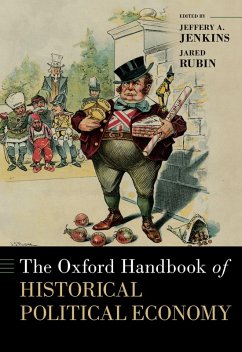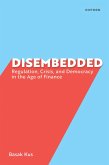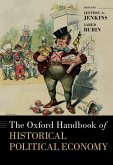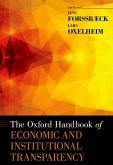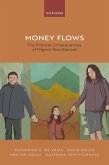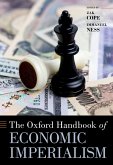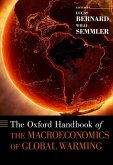The Oxford Handbook of Historical Political Economy (eBook, ePUB)
Redaktion: Jenkins, Jeffery A.; Rubin, Jared


Alle Infos zum eBook verschenken

The Oxford Handbook of Historical Political Economy (eBook, ePUB)
Redaktion: Jenkins, Jeffery A.; Rubin, Jared
- Format: ePub
- Merkliste
- Auf die Merkliste
- Bewerten Bewerten
- Teilen
- Produkt teilen
- Produkterinnerung
- Produkterinnerung

Hier können Sie sich einloggen

Bitte loggen Sie sich zunächst in Ihr Kundenkonto ein oder registrieren Sie sich bei bücher.de, um das eBook-Abo tolino select nutzen zu können.
The Oxford Handbook of Historical Political Economy brings together scholars who are working on essential and field-shaping topics in this burgeoning area. Historical Political Economy (HPE) is the study of how political and economic actors and institutions have interacted over time. It differs from much of economic history in that it focuses on the causes and consequences of politics. It departs from much of conventional political economy in that its context is strictly historical, even if/when it has implications for contemporary political economy. It also departs from much of history in…mehr
- Geräte: eReader
- mit Kopierschutz
- eBook Hilfe
- Größe: 12.75MB
![Disembedded (eBook, ePUB) Disembedded (eBook, ePUB)]() Basak KusDisembedded (eBook, ePUB)16,95 €
Basak KusDisembedded (eBook, ePUB)16,95 €![The Oxford Handbook of Historical Political Economy (eBook, PDF) The Oxford Handbook of Historical Political Economy (eBook, PDF)]() The Oxford Handbook of Historical Political Economy (eBook, PDF)101,95 €
The Oxford Handbook of Historical Political Economy (eBook, PDF)101,95 €![The Oxford Handbook of Economic and Institutional Transparency (eBook, ePUB) The Oxford Handbook of Economic and Institutional Transparency (eBook, ePUB)]() Jens ForssbaeckThe Oxford Handbook of Economic and Institutional Transparency (eBook, ePUB)88,95 €
Jens ForssbaeckThe Oxford Handbook of Economic and Institutional Transparency (eBook, ePUB)88,95 €![Money Flows (eBook, ePUB) Money Flows (eBook, ePUB)]() Catherine de VriesMoney Flows (eBook, ePUB)61,95 €
Catherine de VriesMoney Flows (eBook, ePUB)61,95 €![The Oxford Handbook of Economic Imperialism (eBook, ePUB) The Oxford Handbook of Economic Imperialism (eBook, ePUB)]() The Oxford Handbook of Economic Imperialism (eBook, ePUB)79,95 €
The Oxford Handbook of Economic Imperialism (eBook, ePUB)79,95 €![The Oxford Handbook of the Macroeconomics of Global Warming (eBook, ePUB) The Oxford Handbook of the Macroeconomics of Global Warming (eBook, ePUB)]() The Oxford Handbook of the Macroeconomics of Global Warming (eBook, ePUB)88,95 €
The Oxford Handbook of the Macroeconomics of Global Warming (eBook, ePUB)88,95 €![The Oxford Handbook of Business and Government (eBook, ePUB) The Oxford Handbook of Business and Government (eBook, ePUB)]() The Oxford Handbook of Business and Government (eBook, ePUB)98,95 €
The Oxford Handbook of Business and Government (eBook, ePUB)98,95 €-
-
-
Dieser Download kann aus rechtlichen Gründen nur mit Rechnungsadresse in A, B, BG, CY, CZ, D, DK, EW, E, FIN, F, GR, HR, H, IRL, I, LT, L, LR, M, NL, PL, P, R, S, SLO, SK ausgeliefert werden.
- Produktdetails
- Verlag: OUP eBook
- Erscheinungstermin: 19. März 2024
- Englisch
- ISBN-13: 9780197618615
- Artikelnr.: 70099452
- Verlag: OUP eBook
- Erscheinungstermin: 19. März 2024
- Englisch
- ISBN-13: 9780197618615
- Artikelnr.: 70099452
- Herstellerkennzeichnung Die Herstellerinformationen sind derzeit nicht verfügbar.
* 1. Historical Political Economy: What Is it?
* Jeffery A. Jenkins, University of Southern California
* Jared Rubin, Chapman University
* 2. Interdisciplinary Collaboration in Historical Political Economy
* Tracy Dennison, California Institute of Technology
* Scott Gehlbach, University of Chicago
* 3. Data in Historical Political Economy
* Alexandra Cirone, Cornell University
* 4. Causal Inference and Knowledge Accumulation in Historical
Political Economy
* Anna Callis, University of California, Berkeley
* Thad Dunning, University of California, Berkeley
* Guadalupe Tuñón, Princeton University
* 5. Networks in Historical Political Economy
* Adam Slez, University of Virginia
* 6. Formal Models and Historical Political Economy
* Sean Gailmard, University of California, Berkeley
* 7. Historical Persistence
* Avidit Acharya, Stanford University
* Matthew Blackwell, Harvard University
* Maya Sen, Harvard University
* II. How States are Organized
* 8. Democracy and Historical Political Economy
* David Stasavage, New York University
* 9. Historical Political Economy of Autocracy
* Evgeny Finkel, Johns Hopkins University
* Anna Grzymala-Busse, Stanford University
* 10. Dynasties in Historical Political Economy
* Brenda van Coppenolle, University of Essex
* Daniel Smith, Columbia University
* 11. State Building in Historical Political Economy
* Francisco Garfias, University of California, San Diego
* Emily Sellars, Yale University
* 12. The Size of Polities in Historical Political Economy
* Chiaki Moriguchi, Hitotsubashi University
* Tuan-Hwee Sng, National University of Singapore
* 13. State Capacity in Historical Political Economy
* Mark Dincecco, University of Michigan
* Yuhua Wang, Harvard University
* 14. Legal Capacity in Historical Political Econ
* Mark Koyama, George Mason University
* 15. Political Legitimacy in Historical Political Economy
* Avner Greif, Stanford University
* Jared Rubin, Chapman University
* III. Components of the State
* 16. Rules in Historical Political Economy
* John Wallis, University of Maryland
* 17. Historical Political Economy of Legislative Power
* Gary Cox, Stanford University
* 18. Courts: A Political Economy Perspective
* Tom S. Clark, Emory University
* Georg Vanberg, Duke University
* 19. Bureaucracies in Historical Political Economy
* Jan P. Vogler, University of Konstanz
* 20. The Historical Political Economy of Political Parties
* Jeffery A. Jenkins, University of Southern California
* Christopher Kam, University of British Columbia
* 21. Electoral Systems in Historical Political Economy
* Daniele Caramani, European University Institute, Florence, and
University of Zurich
* 22. Property Rights in Historical Political Economy
* Lee Alston, Indiana University
* Bernardo Mueller, University of Brasília
* 23. Suffrage in Historical Political Economy
* Walker Hanlon, Northwestern University
* 24. Trade Policy in Historical Political Economy
* Douglas Irwin, Dartmouth College
* 25. Taxation: A Historical Political Economy Approach
* Pablo Beramendi, Duke University
* IV. Long-Run Legacies
* 26. Economic Development in Historical Political Economy
* Jose Morales-Arilla, Princeton University
* Joan Ricart-Huguet, Loyola University Maryland
* Leonard Wantchekon, Princeton University
* 27. The Historical Political Economy of Nationalism
* Carles Boix, Princeton University
* 28. Long-Run Economic Legacies of Colonialism
* Jenny Guardado, Georgetown University
* 29. The Historical Political Economy of Globalization
* Kevin O'Rourke, New York University Abu Dhabi
* 30. Civil and Ethnic Conflict in Historical Political Economy
* Saumitra Jha, Stanford University
* 31. The Historical Political Economy of Financial Crises
* Marc Weidenmier, Chapman University
* 32. The Corporation and the State in Historical Political Economy
* Ron Harris, Tel Aviv University
* 33. Electoral Malfeasance in Historical Political Economy
* Isabela Mares, Yale University
* 34. Assimilation in Historical Political Economy
* Vasiliki Fouka, Stanford University
* V. The State and Society
* 35. Race and Historical Political Economy
* David Bateman, Cornell University
* Jake Grumbach, University of Washington
* Chloe Thurston, Northwestern University
* 36. In Search of Gender in Historical Political Economy
* Dawn Teele, Johns Hopkins University
* Pauline Grosjean, University of New South Wales
* 37. Identity in Historical Political Economy
* Pavithra Suryanarayan, London School of Economics and Political
Science
* Steven White, Syracuse University
* 38. Historical Political Economy of Migration
* Volha Charnysh, Massachusetts Institute of Technology
* 39. The Urban-Rural Divide in Historical Political Economy
* Jonathan Rodden, Stanford University
* 40. Immigration in Historical Political Economy
* Margaret Peters, University of California, Los Angeles
* 41. Market and Government Provision of Safety Nets and Social Welfare
Spending in Historical Political Economy
* Price Fishback, University of Arizona
* 42. The Historical Political Economy of Education
* Agustina Paglayan, University of California, San Diego
* 43. Health in Historical Political Economy
* James Feigenbaum, Boston University
* 44. Culture in Historical Political Economy
* Sara Lowes, University of California, San Diego
* 45. Church, State, and Historical Political Economy
* Sascha O. Becker, Monash University
* Steven Pfaff, University of Washington
* 1. Historical Political Economy: What Is it?
* Jeffery A. Jenkins, University of Southern California
* Jared Rubin, Chapman University
* 2. Interdisciplinary Collaboration in Historical Political Economy
* Tracy Dennison, California Institute of Technology
* Scott Gehlbach, University of Chicago
* 3. Data in Historical Political Economy
* Alexandra Cirone, Cornell University
* 4. Causal Inference and Knowledge Accumulation in Historical
Political Economy
* Anna Callis, University of California, Berkeley
* Thad Dunning, University of California, Berkeley
* Guadalupe Tuñón, Princeton University
* 5. Networks in Historical Political Economy
* Adam Slez, University of Virginia
* 6. Formal Models and Historical Political Economy
* Sean Gailmard, University of California, Berkeley
* 7. Historical Persistence
* Avidit Acharya, Stanford University
* Matthew Blackwell, Harvard University
* Maya Sen, Harvard University
* II. How States are Organized
* 8. Democracy and Historical Political Economy
* David Stasavage, New York University
* 9. Historical Political Economy of Autocracy
* Evgeny Finkel, Johns Hopkins University
* Anna Grzymala-Busse, Stanford University
* 10. Dynasties in Historical Political Economy
* Brenda van Coppenolle, University of Essex
* Daniel Smith, Columbia University
* 11. State Building in Historical Political Economy
* Francisco Garfias, University of California, San Diego
* Emily Sellars, Yale University
* 12. The Size of Polities in Historical Political Economy
* Chiaki Moriguchi, Hitotsubashi University
* Tuan-Hwee Sng, National University of Singapore
* 13. State Capacity in Historical Political Economy
* Mark Dincecco, University of Michigan
* Yuhua Wang, Harvard University
* 14. Legal Capacity in Historical Political Econ
* Mark Koyama, George Mason University
* 15. Political Legitimacy in Historical Political Economy
* Avner Greif, Stanford University
* Jared Rubin, Chapman University
* III. Components of the State
* 16. Rules in Historical Political Economy
* John Wallis, University of Maryland
* 17. Historical Political Economy of Legislative Power
* Gary Cox, Stanford University
* 18. Courts: A Political Economy Perspective
* Tom S. Clark, Emory University
* Georg Vanberg, Duke University
* 19. Bureaucracies in Historical Political Economy
* Jan P. Vogler, University of Konstanz
* 20. The Historical Political Economy of Political Parties
* Jeffery A. Jenkins, University of Southern California
* Christopher Kam, University of British Columbia
* 21. Electoral Systems in Historical Political Economy
* Daniele Caramani, European University Institute, Florence, and
University of Zurich
* 22. Property Rights in Historical Political Economy
* Lee Alston, Indiana University
* Bernardo Mueller, University of Brasília
* 23. Suffrage in Historical Political Economy
* Walker Hanlon, Northwestern University
* 24. Trade Policy in Historical Political Economy
* Douglas Irwin, Dartmouth College
* 25. Taxation: A Historical Political Economy Approach
* Pablo Beramendi, Duke University
* IV. Long-Run Legacies
* 26. Economic Development in Historical Political Economy
* Jose Morales-Arilla, Princeton University
* Joan Ricart-Huguet, Loyola University Maryland
* Leonard Wantchekon, Princeton University
* 27. The Historical Political Economy of Nationalism
* Carles Boix, Princeton University
* 28. Long-Run Economic Legacies of Colonialism
* Jenny Guardado, Georgetown University
* 29. The Historical Political Economy of Globalization
* Kevin O'Rourke, New York University Abu Dhabi
* 30. Civil and Ethnic Conflict in Historical Political Economy
* Saumitra Jha, Stanford University
* 31. The Historical Political Economy of Financial Crises
* Marc Weidenmier, Chapman University
* 32. The Corporation and the State in Historical Political Economy
* Ron Harris, Tel Aviv University
* 33. Electoral Malfeasance in Historical Political Economy
* Isabela Mares, Yale University
* 34. Assimilation in Historical Political Economy
* Vasiliki Fouka, Stanford University
* V. The State and Society
* 35. Race and Historical Political Economy
* David Bateman, Cornell University
* Jake Grumbach, University of Washington
* Chloe Thurston, Northwestern University
* 36. In Search of Gender in Historical Political Economy
* Dawn Teele, Johns Hopkins University
* Pauline Grosjean, University of New South Wales
* 37. Identity in Historical Political Economy
* Pavithra Suryanarayan, London School of Economics and Political
Science
* Steven White, Syracuse University
* 38. Historical Political Economy of Migration
* Volha Charnysh, Massachusetts Institute of Technology
* 39. The Urban-Rural Divide in Historical Political Economy
* Jonathan Rodden, Stanford University
* 40. Immigration in Historical Political Economy
* Margaret Peters, University of California, Los Angeles
* 41. Market and Government Provision of Safety Nets and Social Welfare
Spending in Historical Political Economy
* Price Fishback, University of Arizona
* 42. The Historical Political Economy of Education
* Agustina Paglayan, University of California, San Diego
* 43. Health in Historical Political Economy
* James Feigenbaum, Boston University
* 44. Culture in Historical Political Economy
* Sara Lowes, University of California, San Diego
* 45. Church, State, and Historical Political Economy
* Sascha O. Becker, Monash University
* Steven Pfaff, University of Washington
